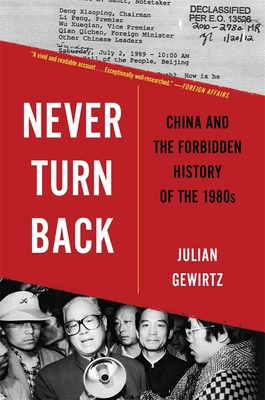

 Belknap Press
Belknap Press
Never Turn Back: China and the Forbidden History of the 1980s


Key Metrics
- Julian Gewirtz
- Belknap Press
- Paperback
- 9780674297241
- -
- -
- History > Asia - China
- English
 Secure Transaction
Secure TransactionBook Description
A Foreign Affairs Best Book of the Year
A BBC History Magazine Best Book of the Year
Excellent...A fascinating, authoritative account of the paths for China's future explored during a decade long buried by official, state-sponsored history.--Julia Lovell, Foreign Policy
A vivid and readable account...Exceptionally well-researched. --Andrew Nathan, Foreign Affairs
The definitive book on China in the 1980s in terms of the depth of research and originality of the argument. ―Minxin Pei, author of The Sentinel State
A gift to our understanding of today's China.―Evan Osnos, author of Age of Ambition
On a hike in Guangdong Province in January 1984, Deng Xiaoping was warned that his path was a steep and treacherous one. Never turn back, the Chinese leader replied. That became a mantra as the government forged ahead with reforms in the face of heated contestation over the nation's future.
Recovering the debates of China in the 1980s, Julian Gewirtz traces the Communist Party's diverse attitudes toward markets, state control, and sweeping technological change, as well as freewheeling public argument over political liberalization. Deng Xiaoping's administration considered bold proposals from within the party and without, including separation between the party and the state, empowering the private sector, and establishing an independent judiciary. After Tiananmen, however, Beijing systematically erased these discussions of alternative directions. Using newly available Chinese sources, Gewirtz details how the leadership purged the key reformist politician Zhao Ziyang, quashed the student movement, recast the transformations of the 1980s as the inevitable products of consensus, and indoctrinated China and the international community in the new official narrative.
Never Turn Back offers a revelatory look at how different China's rise might have been and at the foundations of strongman rule under Xi Jinping, who has intensified the policing of history to bolster his own authority.
Author Bio
Julian Baird Gewirtz has been Senior Fellow for China Studies at the Council on Foreign Relations, a fellow of the Columbia-Harvard China and the World Program, an Academy Scholar at Harvard’s Weatherhead Center for International Affairs, a lecturer in history at Columbia University, and a lecturer in history at Harvard University.
He is the author of several books: Unlikely Partners: Chinese Reformers, Western Economists, and the Making of Global China (Harvard University Press, 2017), which The Economist called "a gripping read, highlighting what was little short of a revolution in China’s economic thought"; Never Turn Back: China and the Forbidden History of the 1980s (The Belknap Press of Harvard University Press, forthcoming 2022); and a book of poems, Your Face, My Flag (Copper Canyon Press, forthcoming 2022).
He completed his doctorate in history in 2018 at the University of Oxford, where he was a Rhodes Scholar. From 2015 to 2016, he was on leave from Oxford and served in the Obama Administration, most recently as special advisor for international affairs to the Deputy Secretary of Energy.
His research is published in the Journal of Asian Studies, Past & Present, The American Scholar, the China Leadership Monitor, and Foreign Affairs. Fluent in Mandarin Chinese, he has also written on Asia for publications including the New York Times, Wall Street Journal, the Washington Post, The Guardian, the Financial Times, Harper’s, and Foreign Policy.
His poems have been published by AGNI, Boston Review, Lambda Literary, The Nation, The New Republic, PEN America, Ploughshares, and The Yale Review, and have received recognition from the Academy of American Poets and Best American Poetry.
Samples of his work are here: “To X (Written on This Device You Made),” “Yde Girl,” and “Spend.” His poetry criticism and nonfiction essays have been published by The Economist, Parnassus: Poetry in Review, the Los Angeles Review of Books, the Poetry Foundation, and the Washington Post.
Source: www.juliangewirtz.com
Videos
No Videos
Community reviews
Write a ReviewNo Community reviews